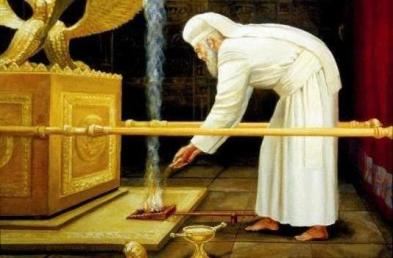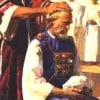A Yom Kippur Tale

This Yom Kippur let me tell you a story. A story that has been passed down regarding events concerning my 3rd great grandfather while he was in Kishinev. From my understanding, at that time, in place of the sacrifices at Yom Kippur which had disappeared long ago, people attending the synagogues and kenessahs would contribute a monetary donation. Considering in the time of the Temple one would pay a set fee for a dove or a goat to be sacrificed on their behalf, then in a sense, atonement could be bought rather than merited. In fact this tradition has continued to this day in which during the Holy days people attending services will find a donation slip for Israel in their seats which they then mark or fold indicating their intention to give after the Holy Day. Some people believe that the more they donate, the more they will be forgiven for their sins and iniquities from the past year. But in the time that this story takes place, the donations would be redirected to those requiring community support at the discretion of the rabbis and hakhams because there was no Israel in existence.
It has always been a concern of mankind that the Mercy of God must be awarded through some means by which He weighs the degree and temerity of one’s sins against their needs and wants and then decides whether or not He should forgive or even help. Otherwise people were at a loss to comprehend why so many good people were left to suffer misfortune, bad people appeared to get away with their crimes, and others that offered so little to society were apparently rewarded, without any divine intercession to even attempt to establish some level of equality. Only God knew how the weights were balanced on this scale of justice. The pursuit of an answer led to the Jewish religious leaders trying to determine the different kinds of mercies afforded by God and the relative comparative value of each one of these mercies which they in turn would use in their determinations of distributing these community donations. The process as you can guess was fraught with disputes and counter-arguments, the pursuit for an answer leading to a further division between Rabbanites and Karaites with the former determining that there were thirteen mercies and Karaites believing there were only nine but possibly eleven if two of these mercies were subcategorized. If those seeking support from the community fell into these categories then it was likely they would receive a degree of funding. But it is a human folly to think that God actually assigns a grade-point average and upon that basis intervenes or not in our lives. And it is arrogant of us to even think we can fathom the nature of God and on what basis He has assigned each one of us our destiny and why he would be concerned with the punishment of individuals. But that is exactly on what basis the determination of distributing alms was made and religious leaders attempted to emulate God’s consciousness and therefore would score one’s iniquities and suffering according to these assigned mercies. As a result, they would award compassion according to the points scored in the assessment and those not meeting this score would receive nothing and therefore be even further punished with further misery in their lives. Where was the mercy in that, I do not know. Having awarded the alms, the rabbis and hakhams would be very satisfied that they in turn had gained clemency and forgiveness for their sins and those of the community through their acts of charity and generosity. Forgiveness in essence had been purchased. A century and a half ago, the religious leaders felt the distribution of alms could not be abused because they would award according to how God would make the assessment. But the arrogance of assuming they could behave in a manner that was God-like only led to abuse and ignored those that may have truly merited the alms as the following story will attest.
In the Fall of 1842
It transpired that in the year of 1842 as Yom Kippur approached rapidly that the Chief Rabbi of the Ukraine, Avraham of Trisk encountered one of the Karaite Hachams whom he knew well, Shelomah ben Afedah ha Cohen, while walking along the streets of Kishenev. As they walked together discussing the finer points of Judaism, they encountered a beggar.
Holding out his hands the beggar pleaded, “Please righteous masters, have mercy upon this poor wretched soul. I have no work and my wife has just recently died and now I have nothing to feed my six children. Please sirs, just a few roubles when you distribute the alms to help in my time of dire need.”
At that point, the two esteemed men of Judaism began to debate the nature of the man’s request. To which Rabbi Avraham commented, “I think that the request needs to be assessed further before it can be granted because God will recognize only four of the thirteen mercies that we must emulate. Therefore his need is only thirty percent of those that would be suffering from far greater hardship.”
Disagreeing with the calculation, Hakham Shelomah rebutted that there are only nine measurements of mercy but this man has only met three. And one must consider if one third of those measurements is enough to warrant granting his request and possibly therefore failing to have the funds for someone that is in far greater need.
As the two great men continued their debate as they walked down the street, they left the man without any answer to his plea, staring in befuddled awe that he may still have no way of purchasing food for his hungry children, his hardships now being assessed as if there was a scale to how much one man must suffer.
“Take it to Zvi Hirsch Chajes” the Rabbi exclaimed wishing to refer it to one of his learned colleagues but “no” replied the Hakham for Chajes was a renown Talmudic Scholar.
Let’s take it to Rabbi Naphtali of Nemirov,” Hakham Shelomah suggested but “No” exclaimed Rabbi Avraham as Naphtali was a student of Nachman Kohen Krochmal a man known to be too friendly with the Karaites and his students actually believed him to be the Messiah.
“Why don’t we take it to the new Principal of Bessarabia,” suggested the hakham. “He is a learned man, having Karaite origins and raised in a rabbanite world. His family is both Cohen-Katz and Kahana. Therefore he shares the knowledge and traditions of both families. “Agreed,” the rabbi responded because he is neither rabbi nor hakham, and considered ‘Aher’ then we are not bound by any decision he might make. “If we disagree, then there is no harm in ignoring all that he says” Both men agreed to take the matter to Principal Jakob Goldenthal for each considered him a man that straddled both worlds, with one foot in Rabbinic Judaism and the other in Karaism and therefore likely even handed.
A Decision is Rendered
Having heard their arguments, Goldenthal responded that the thirteen forms of mercy, enumerated in Ex. xxxiv. 6-7, whereby God rules the world and according to the explanation of Maimonides ("Moreh Nebukim," i. 52), that these middot should not be considered as qualities inherent in God, but merely just a minor portion of His many attributes by which the divine governance appears to the human observer to be controlled. Goldenthal pointed out that in the Sifre that these attributes were not even called "middot," or "qualities" or "measures" but as "derakim" (ways), since they were the ways of God by which Moses came to know God (Ex. xxxiii. 13), and which God, according to the traditional explanation of Ex. xxxiv. 6-7, described to him who He was. Therefore they were never intended to be an actual enumeration of God’s qualities and certainly no man should even attempt to define the limits of God. Goldenthal pointed out that the number thirteen was adopted from the Talmudic and rabbinic tradition, a completely manmade document, whereas the Karaites counted only nine, ten, or even eleven middot based upon the writings of Aaron b. Elijah’s "Keter Torah.” Both of these were attempts by man to have knowledge of the ways of God.
“If that is the case”, Rabbi Avraham challenged, “then why did God demand that we recite the middot on every occasion and especially on Yom Kippur?”
“Did He?” Goldenthal questioned. “I don’t believe that was the case. “I believe the passage means that if one acts according to the pattern of these middot and shows himself compassionate, merciful, and forgiving toward his fellow creatures, then God in return will be compassionate and merciful towards him and will forgive his sins. These are simply ordained rules of life and conduct, but you treat them as mere formulas, and as such they will not be efficacious. It is intended that you exercise and practise all of these virtues and therefore the importance that both of you have attributed to the recitation of these middot lacks any justification at all.”
“That is ridiculous,” the Hakham scoffed. “Why would God even bother to enumerate them if he did not wish for us to enumerate them by heart and recognise that there were nine mercies by which we must judge their actions?”
“Do you think because God only mentioned that we should not steal, commit murder, adultery and bear false witness, that those are the only four crimes by which we should be judged. That any other crime not mentioned in the Decalogue should go unpunished.”
“Of course not,” the rabbi responded. “We have books of law that cover all the other situations.”
“Yes we do but we have never attempted to limit God’s setting of laws by which mankind must adhere. So why do you attempt to place a definitive number on his mercies?” Goldenthal answered.
“So if that is your answer, then how many mercies do you perceive God to have?” inquired the Hakham.
“The answer is simple,” Goldenthal replied. “Since the mercies of God are infinite then the answer is one. Do we not teach that God is All Merciful. There are no limitations for His mercy as it is all encompassing. And so must you be.”
Both the Hakham and Rabbi left his residence and returned through the city the way they had come.
“One mercy,” the Rabbi reiterated, “What do you think of that.”
“Utter nonsense,” replied the Hakham.
“I agree. Fortunately we have no need to listen to him. He is no one of consequence and does not know of what he speaks.”
Passing by the beggar, the two learned men were approached again to see if either would be generous to donate alms after the Yom Kippur. The answer they gave was that they still needed to think about it. Others would have to be measured against the list of mercies before a decision could be rendered. Shaking his head, the dejected beggar returned to his home to let his children know that there would be no food forthcoming this day.
In Conclusion
The commentary on the recitation of mercies from this story can be found in "Meshoret Mosheh," edited by Jakob Goldenthal, in Leipsic in 1845, his feeling compelled to comment on this notion of recitation of Mercies as being enough to merit atonement being a falsehood of both sects. But as Goldenthal pointed out, it was not the recitation that God wanted but our actual demonstration of these mercies. This Yom Kippur we should give consideration to what he had to say. Donating and reciting, these are not acts by which God should forgive us or we should assume justifies our being forgiven. If we wish to atone for our sins and receive God’s mercy then we must physically act and not just recite. We must demonstrate mercy to others, forgive others and help them. Those that show mercy will receive mercy. If all we wish to do is continue to slander, remonstrate and bear ill will to others during this most holy of days then there is no cause to even request forgiveness. If we think deliberate actions to cause harm to others, to speak negatively of another person, to ridicule or mock are going to be forgiven, then think again. As Goldenthal correctly pointed out to these two illustrious gentlemen, to act like God then we in turn must be all merciful and all forgiving ourselves. That is what God was saying to Moses and that is what both our sects have refused to hear.
Hag Sameach to all my readers. May we find that light within ourselves this year.
Avrom Aryeh-Zuk Kahana






